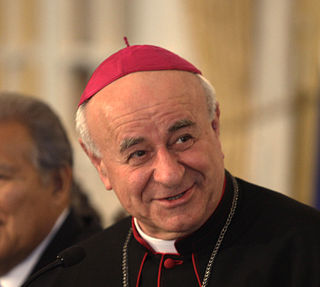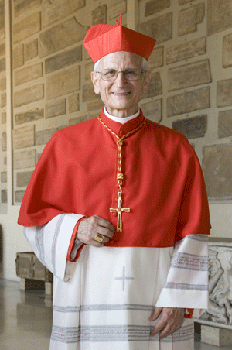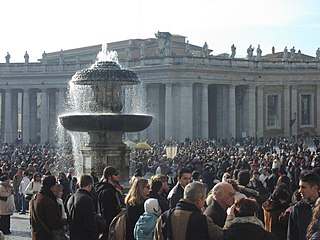
Giovanni Battista Re is an Italian cardinal of the Catholic Church whose service has been primarily in the Roman Curia. He was elevated to the rank of cardinal in 2001. He was prefect of the Congregation for Bishops from 2000 to 2010. As the senior cardinal-bishop in attendance, he chaired the March 2013 papal conclave to elect Pope Benedict XVI's successor. Pope Francis approved his election as Dean of the College of Cardinals on 18 January 2020.

Marc Armand Ouellet is a Canadian prelate of the Catholic Church. He was the prefect of the Dicastery for Bishops and president of the Pontifical Commission for Latin America from 2010 to 2023.

Norberto Rivera Carrera is a Mexican prelate of the Roman Catholic Church who was archbishop of Mexico City from 1995 to 2017. He was made a cardinal in 1998. He was Bishop of Tehuacán from 1985 to 1995.

Peter Kodwo Appiah Turkson is a Ghanaian prelate and cardinal of the Catholic Church who has served as chancellor of the Pontifical Academies of Sciences since 2022. He was president of the Pontifical Council for Justice and Peace from 2009 to 2017 and the inaugural prefect of the Dicastery for the Promotion of Integral Human Development from 2017 to 2021.

Renato Raffaele Martino is an Italian prelate of the Roman Catholic Church. He has been a cardinal since 2003. He has been the longest serving cardinal deacon, the cardinal protodeacon, since June 2014. He served for more than twenty years in the diplomatic service of the Holy See, including sixteen years as Permanent Observer of the Holy See to the United Nations. He held positions in the Roman Curia from 2002 to 2009.
The Pontifical Council for the Family was a pontifical council of the Curia of the Roman Catholic Church from 1981 to 2016. It was established by Pope John Paul II on 9 May 1981 with his motu proprio Familia a Deo Instituta, replacing the Committee for the Family that Pope Paul VI had established in 1973. The Council fostered "the pastoral care of families, protects their rights and dignity in the Church and in civil society, so that they may ever be more able to fulfill their duties."

Jean Clément Marie Gérard Joseph Françoise Georges Laffitte is a French prelate of the Catholic Church. A bishop since 2009, he has had an academic career and served in several positions in the Roman Curia. He has been Prelate of the Sovereign Military Order of Malta since 4 July 2015.

Leonardo Sandri is an Argentine prelate of the Catholic Church who has been a cardinal since November 2007 and vice dean of the College of Cardinals since January 2020. He was prefect of the Congregation for the Eastern Churches from 2007 to 2022. He served in the diplomatic service of the Holy See from 1974 to 1991 in several overseas assignments, including as permanent observer of the Holy See before the Organization of American States from 1989 to 1991, and in Rome as Substitute for General Affairs in the Secretariat of State from 1999 to 2007.
The Pontifical Council for Culture was a dicastery of the Roman Curia charged with fostering the relationship of the Catholic Church with different cultures. It was erected by Pope John Paul II on 20 May 1982 and in 1993 he merged the Pontifical Council for Dialogue with Non-Believers, which had operated independently since 1965 into it. When the Apostolic constitution Praedicate evangelium promulgated by Pope Francis took effect on 5 June 2022, the Pontifical Council for Culture was merged with the Congregation for Catholic Education to create the new Dicastery for Culture and Education.

Vincenzo Paglia is an Italian prelate of the Catholic Church. He is the president of the Pontifical Academy for Life and grand chancellor of the John Paul II Pontifical Theological Institute for Marriage and Family Sciences.
The John Paul II Pontifical Theological Institute for Marriage and Family Sciences is a Roman Catholic pontifical institute of theological studies on marriage and family with affiliated campuses around the world.

Raffaele Farina SDB is an Italian cardinal of the Catholic Church. He was Archivist of the Vatican Secret Archives, Librarian of the Vatican Library, and president of Scuola Vaticana di Paleografia, Diplomatica e Archivistica. Farina was elevated to the cardinalate in 2007.

Stanisław Marian Ryłko is a Polish Cardinal of the Roman Catholic Church. He held positions in the Roman Curia beginning in 1987 and was president of the Pontifical Council for the Laity from 2003 to 2016. He was made a cardinal in 2007. He has been Archpriest of the Basilica of Santa Maria Maggiore since 28 December 2016.

John Tong Hon is a prelate of the Catholic Church from Hong Kong. A cardinal since 2012, he was auxiliary bishop of Hong Kong from 1996 to 2008, then coadjutor bishop of the diocese for a year, and Bishop of Hong Kong from 2009 to 2017. In January 2019, he became the apostolic administrator of the diocese, in a caretaker role, after the death of his successor, Michael Yeung.

Salvatore Fisichella, commonly known as Rino Fisichella, is an Italian prelate of the Roman Catholic Church with the rank of archbishop. He is the current Pro-prefect for the Section of New Evangelization of the Dicastery for Evangelization. He was the president of the Pontifical Council for the Promotion of the New Evangelization from 2010-2022, and the Pontifical Academy for Life from 2008-2010.
The Pontifical Academy for Life or Pontificia Accademia per la Vita is a Pontifical Academy of the Roman Catholic Church dedicated to promoting the Church's consistent life ethic. It also does related research on bioethics and Catholic moral theology. The academy was founded in 1994. Its members are selected by the pope and are to represent different branches of biomedical sciences to promote the Church's life ethic.

Peter Bryan Wells is an American prelate of the Catholic Church who has spent most of his career in the diplomatic service of the Holy See. He has worked in Rome in the administration of the Secretariat of State and in foreign postings. He has been an archbishop and a nuncio since 2016.

Juan Ignacio Arrieta Ochoa de Chinchetru is a Spanish prelate of the Catholic Church who has been secretary of the Pontifical Council for Legislative Texts since 15 February 2007. A bishop since 2008, he has held several other appointments in the Roman Curia.

Catholic laity are the ordinary members of the Catholic Church who are neither clergy nor recipients of Holy Orders or vowed to life in a religious order or congregation. Their mission, according to the Second Vatican Council, is to "sanctify the world".
The Dicastery for the Laity, Family and Life is a dicastery of the Roman Curia. Pope Francis announced its creation on 15 August 2016, effective 1 September 2016. It took over the functions and responsibilities of the Pontifical Council for the Laity and the Pontifical Council for the Family. It has responsibility "for the promotion of the life and apostolate of the lay faithful, for the pastoral care of the family and its mission according to God's plan and for the protection and support of human life."














